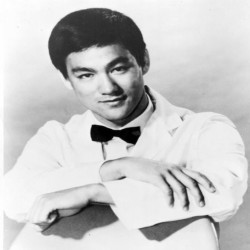
Bruce Lee
| Date of Birth | : | 27 Nov, 1940 |
| Date of Death | : | 20 Jul, 1973 |
| Place of Birth | : | Chinese Hospital, San Francisco, California, United States |
| Profession | : | Martial Artist, Actor |
| Nationality | : | American, Hong Kong |
| Social Profiles | : |
Facebook
Twitter
|
Bruce Lee (Chinese: 李小龍; born Lee Jun-fan, 李振藩; November 27, 1940 – July 20, 1973) was a Hong Kong-American martial artist and actor whose career spanned Hong Kong and the United States. He was the founder of Jeet Kune Do, a hybrid martial arts philosophy drawing from different combat disciplines that is sometimes credited with paving the way for modern mixed martial arts (MMA). Lee is considered by some commentators and martial artists to be the most influential martial artist of all time and a pop culture icon of the 20th century, who bridged the gap between East and West. He is credited with promoting Hong Kong action cinema and helping to change the way Chinese people were presented in American films.
Born in San Francisco and raised in British Hong Kong, Lee was introduced to the Hong Kong film industry as a child actor by his father. However, these were not martial arts films. His early martial arts experience included Wing Chun (trained under Yip Man), tai chi, boxing (winning a Hong Kong boxing tournament), and apparently frequent street fighting (neighbourhood and rooftop fights). In 1959, Lee moved to Seattle. In 1961, he enrolled in the University of Washington. It was during this time in the United States that he began considering making money by teaching martial arts, even though he aspired to have a career in acting. He opened his first martial arts school, operated out of home in Seattle. After later adding a second school in Oakland, California, he once drew significant attention at the 1964 Long Beach International Karate Championships of California by making demonstrations and speaking. He subsequently moved to Los Angeles to teach, where his students included Chuck Norris, Sharon Tate, and Kareem Abdul-Jabbar. In the 1970s, his Hong Kong and Hollywood-produced films elevated the Hong Kong martial arts films to a new level of popularity and acclaim, sparking a surge of Western interest in Chinese martial arts. The direction and tone of his films dramatically influenced and changed martial arts and martial arts films worldwide.
He is noted for his roles in five feature-length Hong Kong martial arts films in the early 1970s: Lo Wei's The Big Boss (1971) and Fist of Fury (1972); Golden Harvest's The Way of the Dragon (1972), directed and written by Lee; and Golden Harvest and Warner Brothers' Enter the Dragon (1973) and The Game of Death (1978), both directed by Robert Clouse. Lee became an iconic figure known throughout the world, particularly among the Chinese, based upon his portrayal of Chinese nationalism in his films, and among Asian Americans for defying Asian stereotypes in the United States. Having initially learnt Wing Chun, tai chi, boxing, and street fighting, he combined them with other influences from various sources into the spirit of his personal martial arts philosophy, which he dubbed Jeet Kune Do (The Way of the Intercepting Fist).
Lee died in July 1973, aged 32. Since his death, Lee has continued to be a prominent influence on modern combat sports, including judo, karate, mixed martial arts, and boxing, as well as modern popular culture, including film, television, comics, animation, and video games. Time named Lee one of the 100 most important people of the 20th century.
Early life
Career and education
Personal life
Names
Lee's Cantonese birth name was Lee Jun-fan (李振藩). The name homophonically means "return again", and was given to Lee by his mother, who felt he would return to the United States once he came of age. Because of his mother's superstitious nature, she had originally named him Sai-fon (細鳳), a feminine name meaning "small phoenix". The English name "Bruce" is thought to have been given by the hospital's attending physician, Dr. Mary Glover.
Lee had three other Chinese names: Lee Yuen-cham (李源鑫), a family/clan name; Lee Yuen-kam (李元鑒), which he used as a student name while he was attending La Salle College, and his Chinese screen name Lee Siu-lung (李小龍; Siu-lung means "little dragon"). Lee's given name Jun-fan was originally written in Chinese as 震藩; however, the Jun (震) Chinese character was identical to part of his grandfather's name, Lee Jun-biu (李震彪). Hence, the Chinese character for Jun in Lee's name was changed to the homonym 振 instead, to avoid naming taboo in Chinese tradition.
Quotes
A goal is not always meant to be reached, it often serves simply as something to aim at.
Absorb what is useful, discard what is not, add what is uniquely your own.
Do not pray for an easy life, pray for the strength to endure a difficult one
I fear not the man who has practiced 10,000 kicks once, but I fear the man who has practiced one kick 10,000 times.
Are you going to let the obstacles in your life be stumbling blocks or stepping stones? Choose the positive. You are the master of your attitude.
Empty your mind, be formless. Shapeless, like water. If you put water into a cup, it becomes the cup. You put water into a bottle and it becomes the bottle. You put it in a teapot it becomes the teapot. Now, water can flow or it can crash. Be water, my friend.
When you say that something is impossible, you have made it impossible.
Remember, success is a journey not a destination. Have faith in your ability. You will do just fine.
Knowledge earns you power, character earns you respect.
Long-term consistency trumps short-term intensity.
